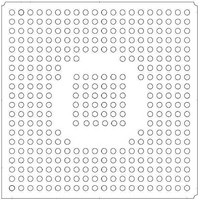EP9315-IBZ Cirrus Logic Inc, EP9315-IBZ Datasheet - Page 210

EP9315-IBZ
Manufacturer Part Number
EP9315-IBZ
Description
32-Bit Microcontroller IC
Manufacturer
Cirrus Logic Inc
Series
EP9r
Specifications of EP9315-IBZ
Controller Family/series
(ARM9)
Core Size
32 Bit
A/d Converter
12 Bits
Supply Voltage
3.3V
No. Of I/o Pins
65
Package / Case
352-PBGA
Clock Frequency
200MHz
Core Processor
ARM9
Speed
200MHz
Connectivity
EBI/EMI, EIDE, Ethernet, I²C, IrDA, Keypad/Touchscreen, PCMCIA, SPI, UART/USART, USB
Peripherals
AC'97, DMA, I²:S, LCD, LED, MaverickKey, POR, PWM, WDT
Number Of I /o
16
Program Memory Type
ROMless
Ram Size
32K x 8
Voltage - Supply (vcc/vdd)
1.65 V ~ 3.6 V
Data Converters
A/D 8x12b
Oscillator Type
External
Operating Temperature
-40°C ~ 85°C
Processor Series
EP93xx
Core
ARM920T
Data Bus Width
32 bit
3rd Party Development Tools
MDK-ARM, RL-ARM, ULINK2
Development Tools By Supplier
EDB9315A-Z
Lead Free Status / RoHS Status
Lead free / RoHS Compliant
For Use With
598-1144 - KIT DEVELOPMENT EP9315 ARM9
Eeprom Size
-
Program Memory Size
-
Lead Free Status / Rohs Status
Details
Other names
598-1263
Available stocks
Company
Part Number
Manufacturer
Quantity
Price
Company:
Part Number:
EP9315-IBZ
Manufacturer:
CIRRUS
Quantity:
13
Company:
Part Number:
EP9315-IBZ
Manufacturer:
CIRRUS
Quantity:
347
- Current page: 210 of 824
- Download datasheet (13Mb)
7
7-28
Raster Engine With Analog/LCD Integrated Timing and Interface
EP93xx User’s Guide
7.4.10 Video Timing
The video timing circuitry consists of a horizontal down counter and a vertical down counter.
Signal timing for a specific video format is generated by programmable values that are
compared to the count values.
An AC signal is generated to support either bias voltage switching for LCDs or a field
indicator for interlaced video. The An AC signal, if ACEN = ‘1’ in the
output on the P[17] pin. The toggle rate of the AC signal is selected by writing to the
register.
LCD shifting signals, XECL and YSCL, are generated to support simple LCDs. These signals,
if LCDEN = ‘1’ in the
respectively. XECL is generated every 64 pixel clocks. YSCL is the inversion of HSYNCn.
The Raster Engine provides an end of frame interrupt, when enabled, to the interrupt
controller. This interrupt defines when the last information has been sent to the display for the
current frame. It indicates the start of an interval when changes can be made to the LUT or
source for the displayed image without affecting the display. It must be configured as an edge
triggered interrupt. Changes such as a new cursor location or a new screen image location
automatically change at this time, under hardware control. The interval for making LUT
changes, etc. without affecting the displayed image depends on the display’s technology. The
time duration is equal to the vertical blanking interval (VLinesTotal duration - VACTIVE
duration).
In addition, the programmable VCLR and HCLR fields in the
a secondary interrupt during normal operation, where the interrupt can be programmed to
trigger at any vertical and horizontal counter combination.
The frequency of the clock used for video timing and the entire video pipeline must meet the
requirements of the display type. The video clock frequency is selected by writing to the
VidClkDiv
corresponds to a 1280 pixels by 1024 pixels display size, and non-interlaced video at a 80Hz
frame refresh.
The programmed values for the video timing section of the raster engine are shown in
Figure 7-9, "Progressive/Dual Scan Video Signals"
Signals". Independent horizontal and vertical down counters are used as a reference for all
other signals. The synchronization, blanking, and active video control signalling is generated
by comparing programmed values to the counters.
Note: Total Bus/SDRAM bandwidth is shared between the Raster Engine and other device
controllers. The pixel depth, display size, and display refresh rate can be limited by the
Bus/SDRAM bandwidth that is available to the Raster Engine.
register (see
“VideoAttribs”
Chapter
Copyright 2007 Cirrus Logic
5). The video circuitry is targeted to run up to 132MHz. This
register, are output on pixel data pins P[16] and P[15],
and
Figure 7-10, "Interlaced Video
“SigClrStr”
“VideoAttribs”
register are used as
register, is
“ACRate”
DS785UM1
Related parts for EP9315-IBZ
Image
Part Number
Description
Manufacturer
Datasheet
Request
R

Part Number:
Description:
IC ARM9 SOC ENH UNIV 352PBGA
Manufacturer:
Cirrus Logic Inc
Datasheet:

Part Number:
Description:
IC ARM920T MCU 200MHZ 352-PBGA
Manufacturer:
Cirrus Logic Inc
Datasheet:

Part Number:
Description:
IC ARM920T MCU 200MHZ 352-PBGA
Manufacturer:
Cirrus Logic Inc
Datasheet:

Part Number:
Description:
MCU, MPU & DSP Development Tools Eval Bd Uni. ARM9 SOC Processor
Manufacturer:
Cirrus Logic Inc
Datasheet:

Part Number:
Description:
Development Kit
Manufacturer:
Cirrus Logic Inc
Datasheet:

Part Number:
Description:
Development Kit
Manufacturer:
Cirrus Logic Inc
Datasheet:

Part Number:
Description:
High-efficiency PFC + Fluorescent Lamp Driver Reference Design
Manufacturer:
Cirrus Logic Inc
Datasheet:

Part Number:
Description:
Development Kit
Manufacturer:
Cirrus Logic Inc
Datasheet:

Part Number:
Description:
Development Kit
Manufacturer:
Cirrus Logic Inc
Datasheet:

Part Number:
Description:
Development Kit
Manufacturer:
Cirrus Logic Inc
Datasheet:

Part Number:
Description:
Development Kit
Manufacturer:
Cirrus Logic Inc
Datasheet:

Part Number:
Description:
Development Kit
Manufacturer:
Cirrus Logic Inc
Datasheet:

Part Number:
Description:
Development Kit
Manufacturer:
Cirrus Logic Inc
Datasheet:

Part Number:
Description:
Ref Bd For Speakerbar MSA & DSP Products
Manufacturer:
Cirrus Logic Inc












